
The Business of Fashion
Agenda-setting intelligence, analysis and advice for the global fashion community.

Agenda-setting intelligence, analysis and advice for the global fashion community.
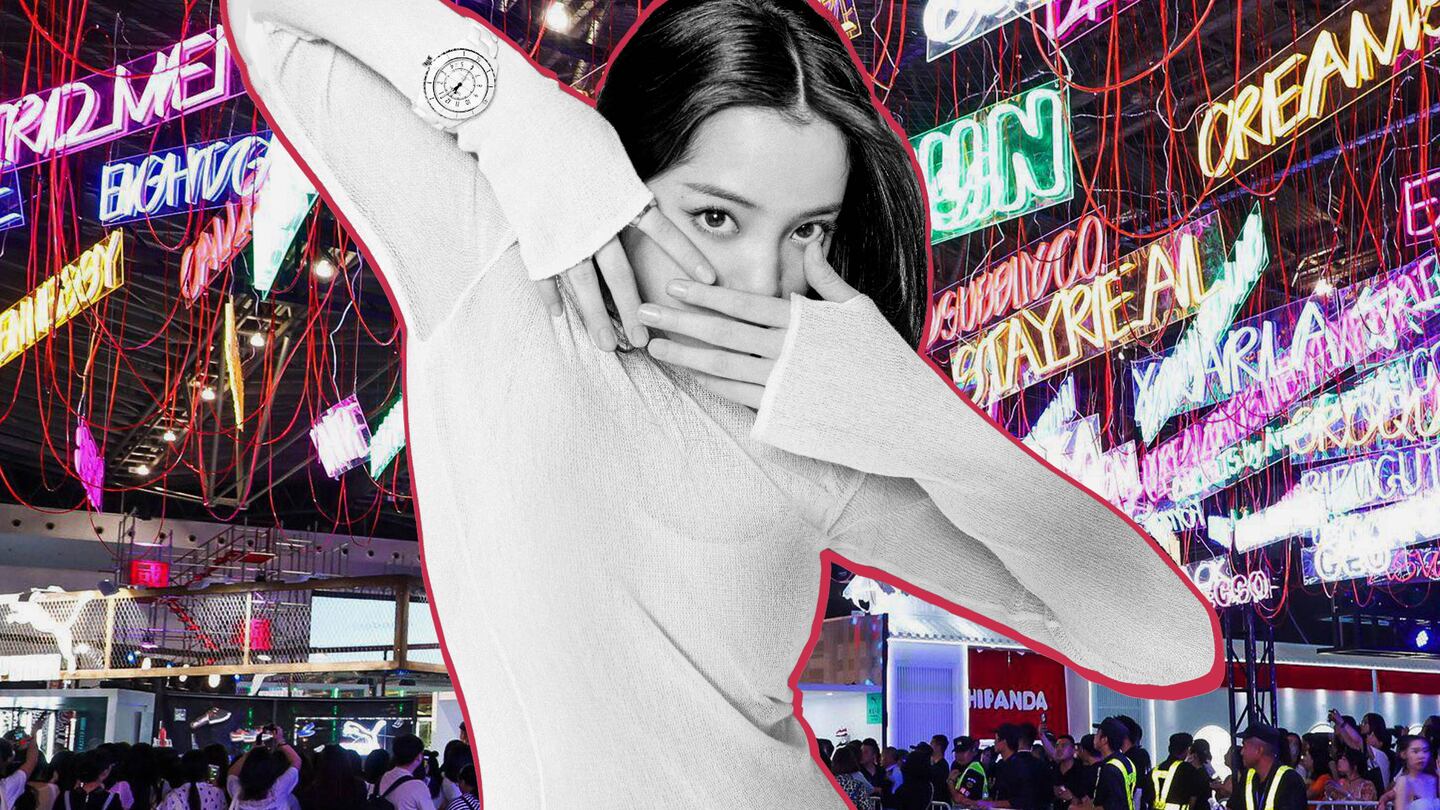
SHANGHAI, China — On a wet and windy weekend in Shanghai, with the spectre of Typhoon Lekima bearing down on the city, flash flooding in the streets and a hobbled public transport system, they still came.
Young Chinese fashion lovers, many of them still in high school, turned out for the first Labelhood-backed edition of Youtopia: a fashion-focused festival aimed at giving young people interested in the fashion industry a taste of design, culture, mentorship and more.
Part-trade show, part-fashion show and part-exhibition, the hybrid event was held in Shanghai’s downtown Jing’an District on August 10 and 11. Packed with attentive young festival-goers, eager to celebrate and learn, the event was also a golden opportunity for brands to recruit, create awareness and even to sell to a sophisticated microcosm of China’s 150 million young people born after the year 2000.
Events like this give the Post-'00s Generation — as the demographic is known in China — what they really crave: a sense of belonging, authenticity and community.
ADVERTISEMENT
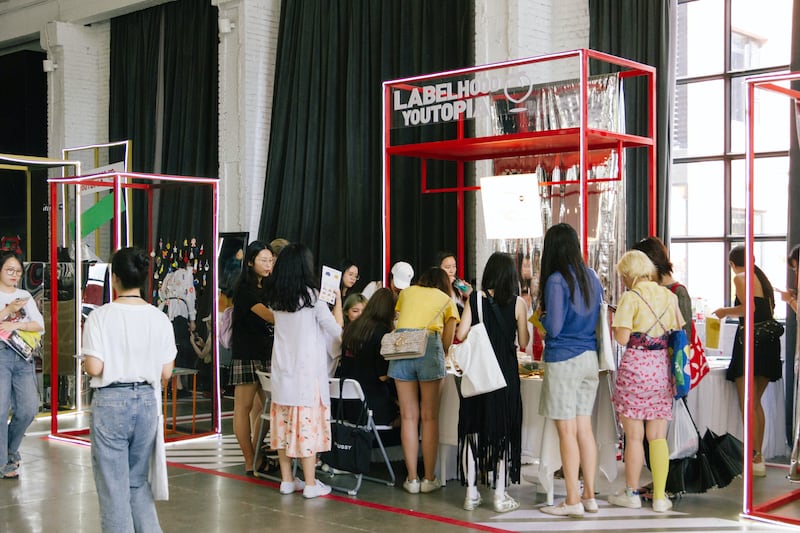
Millennials at Youtopia | Source: Courtesy
Labelhood, an umbrella organisation which encompasses a platform for up-and-coming designers to present their work at Shanghai Fashion Week, as well as several multi-brand stores selling independent Chinese brands, acquired Youtopia with a view to attracting and fostering young fashion talent within its community.
Tasha Liu, Labelhood co-founder, said Youtopia, which until now was run by high school students, for high school students, deserved an "upgrade."
“They needed us, but we also need them to create more impact for the younger generation who are passionate about entering the Chinese fashion industry,” Liu said.
Given the ways in which China has become vital for the global fashion industry in terms of consumption, and the already large and increasing numbers of Chinese students graduating from fashion schools around the world, it’s easy to forget that China’s fashion industry is still in its infancy.
Outfits completed as part of a fashion design competition were presented by high school and undergraduate designers, who had undergone three months of mentoring from Chinese fashion designers — including BoF 500 members Angel Chen and Daniel Chen Xuzhi, who are not really that much older than the mentees themselves.
“I think it’s quite important [for fashion students or potential fashion students to feel a part of the culture of fashion in China, but we also] want to think ahead about how to bring more young people into this community,” Liu added.
The fact that this was initially a platform created by (very) young people speaks to the need young people in China have for real-world events that allow them to connect and create communities around fashion and its related sub-cultures, even as it seems most of their attention is directed toward the digital realm.
ADVERTISEMENT
It gives consumers a good opportunity to share their hobby with like-minded people, and show their understanding of fashion or a fashion subculture.
Chinese youth, like their counterparts around the world, are digital natives, raised on online content and accustomed to purchasing online, usually on their phones. According to data from Hylink, China’s post-90s generation checks their phone every 15 minute, on average, with shopping coming second only to social media in terms of popular mobile pastimes.
But it is these same consumers, identified by Alibaba President Daniel Zhang as “the main consumption power” in China, who are increasingly the target of a growing number of offline events, fashion- and culture-focussed festivals such as the Yoho! media group’s upcoming Yo’hood Festival (running August 29 to September 6) and celebrity streetwear entrepreneur Edison Chen’s Innersect, due to make its fourth appearance in Shanghai this December.
According to founder of the youth media empire Yoho!, Liang Chao, also known by his English name, Mars, Yo'hood was born seven years ago as a real world place for like-minded people to come together, communicate and discover new streetwear trends and brands.
In the intervening years, the event has expanded into a week-long celebration of youth culture with Chinese characteristics, with thousands of young people streaming past hundreds of booths touting everything from limited edition sneakers to bubble tea.
“It gives consumers a good opportunity to share their hobby with like-minded people, and show their understanding of fashion or a fashion culture, [thereby] spreading the influence of a particular sub-culture,” Liang said, adding that brands also benefit from being put in front of their intended Chinese consumer base, especially small- to medium-sized brands without the resources for a widespread physical retail presence in the China market.
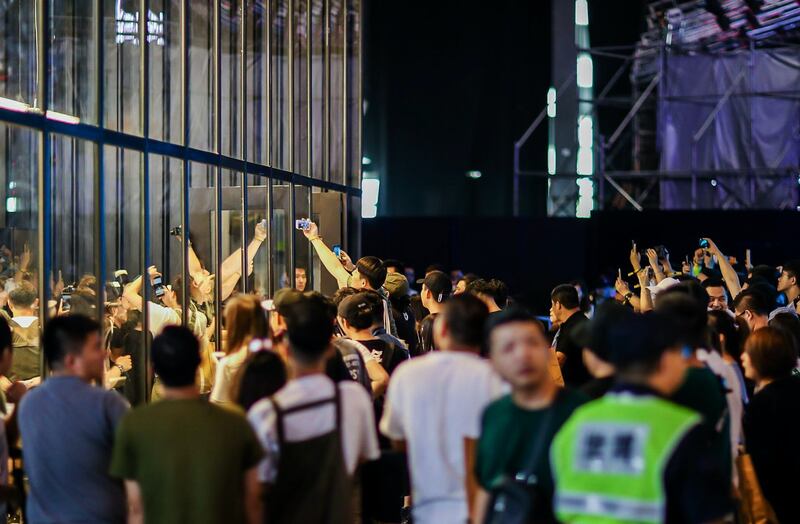
People clamouring to take photos at Yo'hood | Source: Courtesy
The latest iteration of Yo’hood will be the first time the event has been extended to a full week, with what Liang describes as a 360-degree cultural offering of not only streetwear brands but also lifestyle, food and beverage and entertainment a big part of the mix.
The event, which is expected to see more than 60,000 visitors, has appointed Dazed Media Chief Executive and Co-Founder Jefferson Hack as its creative director. Hack has, in turn, tapped artist Daniel Arsham to create branding and set design for the festival, which will also serve as the launchpad for the first print issue of Dazed China, a publication being brought to China in partnership with Liang's Yoho! media group.
ADVERTISEMENT
"The partnership and [launching Dazed China at Yo'hood is] an opportunity for Chinese trend culture and Western trend culture to merge and collide, making a bridge between the two," Liang said.
Indeed, international giants such as Nike, New Balance and Asics rub shoulders at Yo’hood with niche streetwear players like Stussy, Places + Faces, M+RCNoir and Irene Kim’s Ireneisgood label. Yo’hood also features Asian brands, and is a popular place for Asian stars to reach consumers for their fashion forays. Actor Shawn Yue’s Madness and Singaporean singer JJ Lin’s SMG have both previously been involved.
Other artists have also jumped on the bandwagon, with last year’s Yo’hood seeing the debut of special works from Kaws and Ron English.
These forums will benefit some brands while proving nonsensical for others who don't fit the target consumer demographic.
Held in halls traditionally more accustomed to hosting staid trade shows, events such as Yo’hood and Innersect veritably buzz with what Michael Norris, research and strategy manager at AgencyChina, describes as “huo li,” a Chinese term that roughly translates as “a powerful cultural, commercial and demographic energy.”
“The festivals give established, niche and emerging brands an opportunity to actively shape the local fashion circuit… As streetwear's influence grows, the opportunity to have lasting influence on the scene drives continued investment,” Norris said.
Though these events are hosted offline, the opportunities for online engagement are everywhere, with every brand, booth and surface of the space designed with selfies in mind, and the thousands of attendees dutifully recording and publishing their festival experience on their WeChat Moments for their friends to see and appreciate. QR codes, scanned for direct links to e-commerce landing pages, are everywhere.
The ways in which offline events such as Yo'hood and Innersect meld digital opportunities into the fabric of their operations can also be a lesson for brands in terms of their broader retail strategy in China.
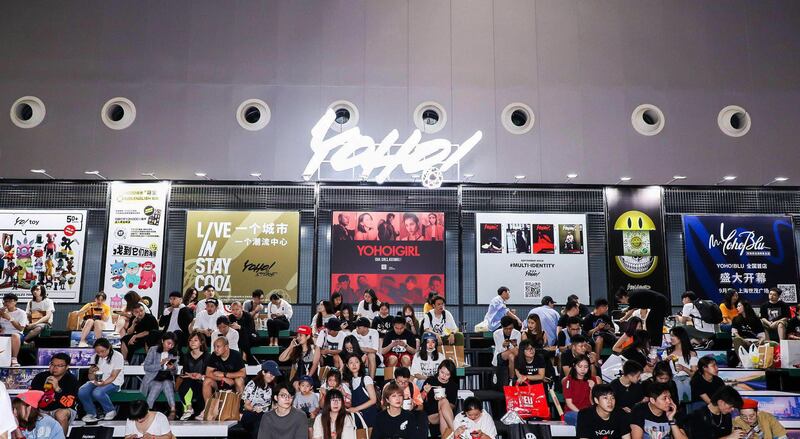
Attendees at Yo'hood | Source: Courtesy
It’s common to see international brands invest heavily in an amazing design and selfie-friendly experience with digital engagement opportunities wherever you look for their Yo’hood or Innersect pop-up, but go into the same brand’s retail stores in China and that seamless digital amalgamation is vastly diminished.
For Gen-Z consumers, 99 percent of whom still choose to shop in real world stores that offer them a “fun and engaging” experience, according to a new report from A.S. Watson Group.
Perhaps this gap between special event retail and its more mundane everyday cousin will diminish as platforms mature and brands become more familiar with the benefit they derive from them.
Norris, for one, describes the current attitude for both organisers and participating brands as “exploratory,” with lessons learned from festivals perhaps leading to inspiration for future retail development in China and elsewhere.
“No hard and fast rules exist,” he said. “These forums will benefit some brands while proving nonsensical for others [who don’t fit the target consumer demographic].”
Either way, Youtopia, Yo’hood and Innersect provide an important reminder to brands that — despite the uniqueness of their market environment — China’s young people have a lot in common with their global peers.
Digital may be the dominant channel for teens looking to find out about brands and frame their own unique style, but it seems there is little substitute for showing people a good time in the “real world” to foster community and connection.
时尚与美容
FASHION & BEAUTY
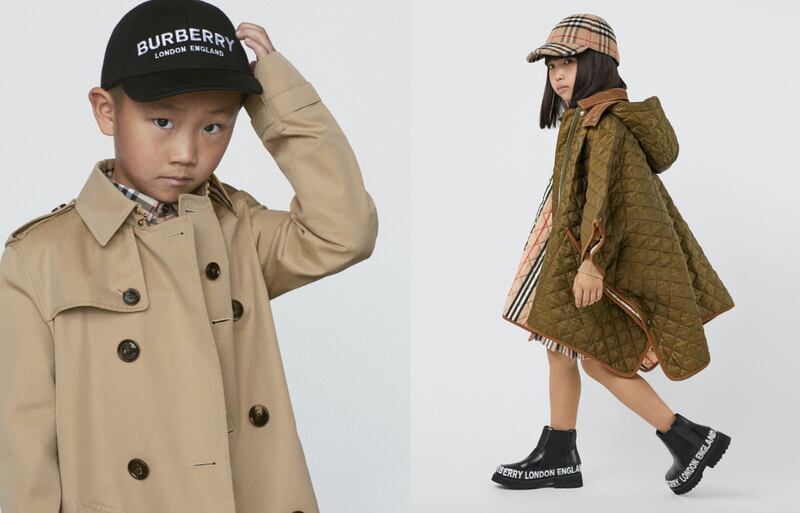
Images from Burberry’s Fall/Winter 2019 pre-collection for children | Source: Burberry
How Luxury Brands Can Rise to the End of China’s One-Child Policy
Since China announced the end of its one child policy in 2015 and affirmed plans to end family planning initiatives, analysts are anticipating a shift in the mainland's consumption habits. The demographic changes are expected to provide a boost to the Chinese economy — a high fertility rate equals a larger cohort of future luxury shoppers — and brands will be poised to tap niche segments such as baby care, maternity wear and childrenswear. According to Amrita Banta, managing director of Agility Research & Strategy, luxury purchases will pivot from impulsive to rational, with new or expecting parents placing greater consideration on durability and practicality. Experiential travel and organically produced segments are likely to benefit from the growth of young families, and adapting to the needs of millennial parents will be critical for luxury brands. (SCMP)
Luxury’s Next Most-Wanted Chinese Ambassadors Are…
In the wake of China's flurry of ambassador-brand break-ups and apologies, numerous brands will be looking out for new celebrity collaborators. This week, Marketing consultancy R3 released its latest monthly celebrity ambassador rankings. The list's top two names, Yang Zi and Li Xian, both star in an up-and-coming television drama, "Go Go Squid" — Yang has already been appointed Benefit's Chinese ambassador and attended events by Marc Jacobs, while Li has gone untapped by luxury brands but has worked with Puma, Airbnb, and Avène. At third place, 'little fresh meat' Jonny Bai has already been noticed by the likes of Tiffany, Cartier, and Lancôme, followed by well-known luxury ambassadors such as Yang Mi (who recently ended her relationship with Versace) and Cai Xukun. (Jing Daily)
What China Slowdown? Estée Lauder’s Asia Sales Soar 18 Percent
Estée Lauder Companies released its latest set of financials on August 19, revealing that sales in the Asia Pacific region grew 18 percent in the fourth quarter. The figures beat estimates and the company's shares rose as much as 11 percent to $198.62, while it forecasted better-than-expected first quarter sales growth and profit in spite of volatility that may yet ensue from Brexit, the US-China trade war and protests in Hong Kong. According to Chief Executive Fabrizio Freda, Hong Kong accounts for less than 4 percent of Estée Lauder's global business, and the group is working to recover potential losses from other markets. The news dovetails with the boom that rival L'Oréal is seeing in the mainland, putting concerns of slowing demand to rest — for now. (Reuters)
科技与创新
TECH & INNOVATION
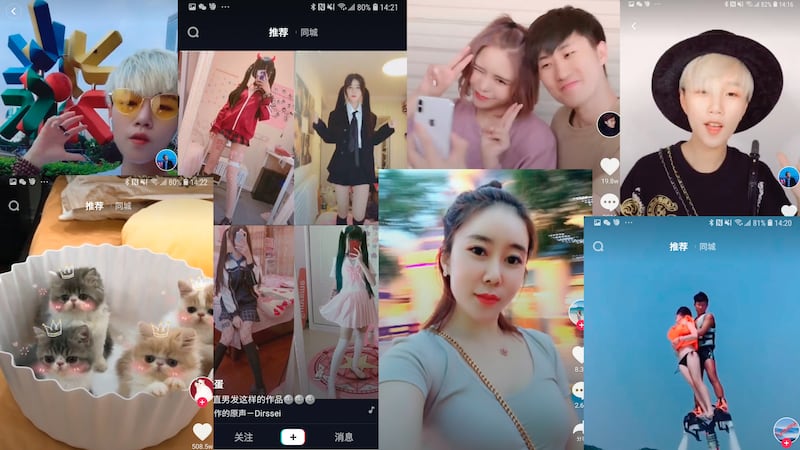
Screenshots of videos on Douyin | Collage by BoF
Users Spent $11.7 Million on Douyin and Tiktok in July
Virtual money is making bank for Chinese short video app Douyin and its western sister platform Tiktok. According to mobile app intelligence firm Sensor Tower, the two apps grossed $11.7 million through in-app sales of virtual coins last month, marking a 290 percent increase year-on-year. Virtual currencies (used to purchase gifts for livestreamers) are shaping up to be a major opportunity for the relatively new apps — which were launched in 2016 and 2017 respectively — but advertising still makes up the bulk of its revenues at an estimated 40 billion yuan ($5.6 billion) in 2019, according to Netease. (Technode)
Baidu No Longer Among China's Top 5 Most Valuable Tech Companies
China's once-reigning search engine has been left out of the country's top five most valuable publicly traded internet companies, after its market capitalisation slid below that of gaming and e-commerce firm NetEase and it was overtaken by group-buying firm Meituan. In recent years, Baidu has lagged behind as other members of China's revered BAT trio (Baidu, Alibaba, Tencent) made leaps and bounds through e-commerce, gaming and mobile payments. Despite holding a 70 percent market share after Google's exit from the mainland in 2010, Baidu has failed to adapt to China's new social media landscapes, as screen-time becomes increasingly dominated by 'super app' ecosystems such as WeChat. However, the week hasn't been all bad for the firm, which reported better-than-expected earnings for its second quarter on Monday and saw its shares soar soon after — it joined Sina and Weibo, who also reported positive figures, dispelling worries about slowing demand in China's tech industry. (Abacus)
Controversial Social Commerce App Secures $42 Million for A Plus Round
Guangzhou-based social e-commerce app Peanut Diary secured a 300 million yuan ($42 million) A plus round of strategic investment, the company announced on August 19. The news comes just five months after the firm was slapped with a 1.5 million yuan (around $212,308) fine — the second largest in the history of Chinese e-commerce — and had over 73.1 million yuan ($10.3 million) in illegal income confiscated for operating a pyramid sales scheme. The allegations go to the core of Peanut Diary's business model: on the app, users become members after paying a 99 yuan ($14) fee, and the more referrals the members make, the higher commission they receive. With its financing, the firm is looking to tap China's online travel and online education businesses; details regarding investors have not yet been announced. (Technode)
消费与零售
CONSUMER & RETAIL
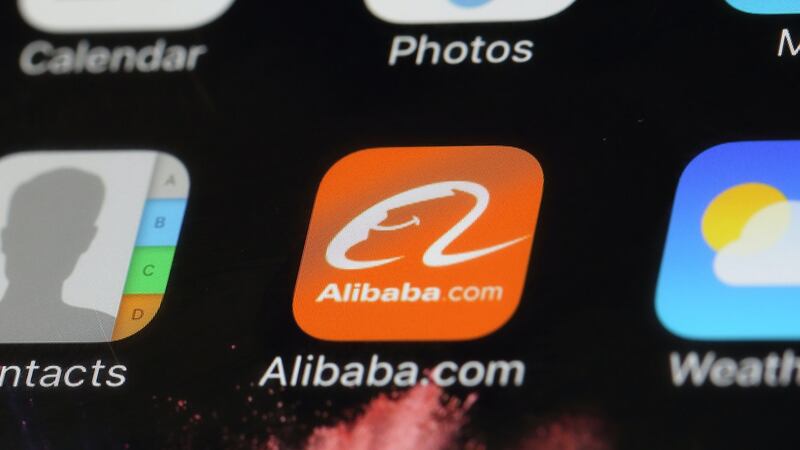
Source: Shutterstock
After Beating Wall Street’s Expectations, Alibaba Reconsiders Second Hong Kong Listing
Last week, Alibaba's shares rose over 3.25 percent in New York after the retail giant announced strong figures for the quarter ended June. The company's revenues had risen 42 percent to $16.7 billion, which against a backdrop of strong retail sales is quelling concerns around slowing consumption in the mainland. But the company is seeing more uncertainty close to home in Hong Kong, where it was announced on August 21 that it will postpone its estimated $15 billion listing — potentially this year's biggest equity deal globally and the largest follow-on share sale in seven years — amid local political unrest. All eyes have been on Alibaba, whose hesitation speaks volumes on the financial hub's volatility, stemming from 11 weeks of pro-democracy protests that plunged the city's Hang Seng index to seven-month lows last week. Alibaba could launch the deal as early as October, but no formal timetable has been set. (Forbes)
China’s Ageing Population: A Sea Change for Retail
Though this year's news of China's upcoming population decline — and estimates that the country's population could shrink as soon as 2027 — is worrying for retailers, companies can reverse their fortunes by catering to China's soon-to-be seniors. Ageclub, an incubator focusing on goods and services targeting senior consumers, identified that the entrance of Post-60's shoppers residing in top-tier cities into the senior bracket will mark a turning point for retail. According to Ageclub, these 'new seniors' will be more independent and concerned with individuality than their predecessors, and businesses relevant to health care, entertainment and adult education will stand to benefit. What's more is that they will be attuned to social media and e-commerce, and apps such as WeChat are shape growing demand for beauty products, apparel and accessories that serve older consumers, whose tastes will be increasingly sophisticated. (Ebrun)
Line and WeChat Ink Payments Partnership
Line Pay — the mobile payments arm of Japan's top communications app Line — is integrating WeChat Pay into merchant's payment options, it was announced this week. Where WeChat Pay boasts over 1.118 billion users, the deal aims to streamline payment processes for Chinese tourists in Japan, who will be able to pay with their WeChat Pay balance when shopping at any store that accepts Line Pay. However, the deal only goes one way: WeChat won't be integrating Line Pay into accounts for merchants in China. "This is especially convenient for tourists because they can use their accustomed payment service, and eliminate the hassle of buying yen or using other payment options just for their trip," a press release said. (Ebrun)
政治、经济、社会
POLITICS, ECONOMY, SOCIETY
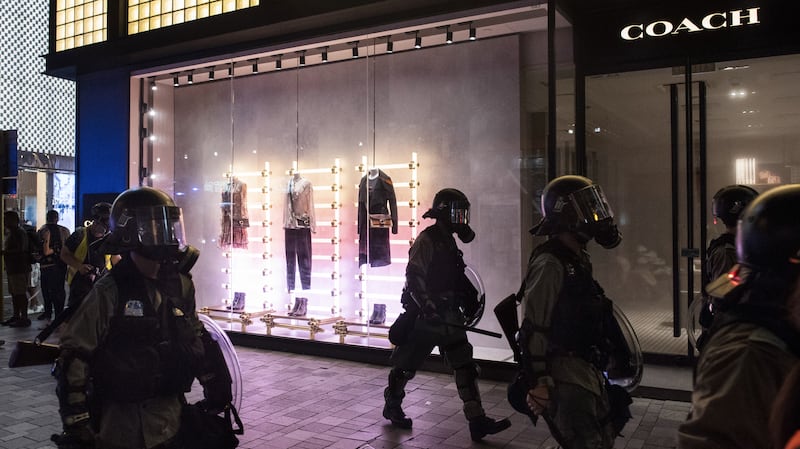
Riot police officers rush through the streets during anti-government protests in Hong Kong | Source: Getty Images
Beijing Used Facebook and Twitter in Its Disinformation War in Hong Kong
Though the two social media platforms are blocked in China, Facebook and Twitter accounts allegedly opened in the country have been coordinated to amplify messages and images that portray Hong Kong's protestors as terrorists and "[undermine] the legitimacy and political positions of the protest movement on the ground," said Twitter in a statement, which dubbed the efforts a "coordinated state-backed operation." The activity suggests that Beijing was targeting English-speaking netizens in Hong Kong, where both platforms are widely used. In response, Facebook has shut down seven pages, three groups and five accounts, and Twitter has deleted 936 accounts — the first time that either firm has taken down an account due to disinformation in the mainland. A spokesman for China's Ministry of Foreign Affairs has described this approach as "entirely reasonable." (New York Times)
Trump Acknowledges that Trade War Might Mean Economic Pain for the US
On August 20, President Trump conceded that his trade policies could mean hardship at home, but insisted that such measures are necessary in the long term. At the White House, Trump said that he will persevere on his aggressive demands in the trade standoff "whether it's good or bad" for the prospects of a recession. Though Trump is considering moves to boost growth — from a temporary payroll tax cut to calling for the Federal Reserve to sharply cut interest rates — he insisted that this is not a symptom of a weakening economy. "Somebody had to take China on," he said. "My life would be a lot easier if I didn't take China on." (Time)
Chinese Official Rules Out Same-Sex Marriage
Though the city of Beijing legally recognised its first guardianship agreement between a duo of the same sex earlier this month, China is staying true to its conservative views on marriage. Same-sex unions will not be legally recognised in mainland China, Zang Tiewei, a spokesman for the legal affairs committee of China's top legislative body, said on August 21. In response to a journalist's question on marriage equality, Zang said that marriage is defined by local law as a union between a man and a woman — a view "consistent with [the] country's national circumstances, history, and culture." (Sixthtone)
China Decoded wants to hear from you. Send tips, suggestions, complaints and compliments to our Shanghai-based Asia Correspondent casey.hall@businessoffashion.com.
With consumers tightening their belts in China, the battle between global fast fashion brands and local high street giants has intensified.
Investors are bracing for a steep slowdown in luxury sales when luxury companies report their first quarter results, reflecting lacklustre Chinese demand.
The French beauty giant’s two latest deals are part of a wider M&A push by global players to capture a larger slice of the China market, targeting buzzy high-end brands that offer products with distinctive Chinese elements.
Post-Covid spend by US tourists in Europe has surged past 2019 levels. Chinese travellers, by contrast, have largely favoured domestic and regional destinations like Hong Kong, Singapore and Japan.